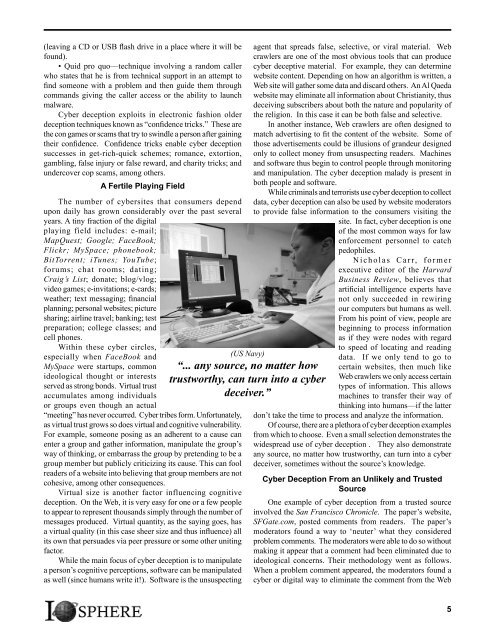Download - IO Sphere
Download - IO Sphere
Download - IO Sphere
You also want an ePaper? Increase the reach of your titles
YUMPU automatically turns print PDFs into web optimized ePapers that Google loves.
(leaving a CD or USB flash drive in a place where it will be<br />
found).<br />
• Quid pro quo—technique involving a random caller<br />
who states that he is from technical support in an attempt to<br />
find someone with a problem and then guide them through<br />
commands giving the caller access or the ability to launch<br />
malware.<br />
Cyber deception exploits in electronic fashion older<br />
deception techniques known as “confidence tricks.” These are<br />
the con games or scams that try to swindle a person after gaining<br />
their confidence. Confidence tricks enable cyber deception<br />
successes in get-rich-quick schemes; romance, extortion,<br />
gambling, false injury or false reward, and charity tricks; and<br />
undercover cop scams, among others.<br />
A Fertile Playing Field<br />
The number of cybersites that consumers depend<br />
upon daily has grown considerably over the past several<br />
years. A tiny fraction of the digital<br />
playing field includes: e-mail;<br />
MapQuest; Google; FaceBook;<br />
Flickr; MySpace; phonebook;<br />
BitTorrent; iTunes; YouTube;<br />
forums; chat rooms; dating;<br />
Craig’s List; donate; blog/vlog;<br />
video games; e-invitations; e-cards;<br />
weather; text messaging; financial<br />
planning; personal websites; picture<br />
sharing; airline travel; banking; test<br />
preparation; college classes; and<br />
cell phones.<br />
Within these cyber circles,<br />
especially when FaceBook and<br />
MySpace were startups, common<br />
ideological thought or interests<br />
served as strong bonds. Virtual trust<br />
accumulates among individuals<br />
or groups even though an actual<br />
“meeting” has never occurred. Cyber tribes form. Unfortunately,<br />
as virtual trust grows so does virtual and cognitive vulnerability.<br />
For example, someone posing as an adherent to a cause can<br />
enter a group and gather information, manipulate the group’s<br />
way of thinking, or embarrass the group by pretending to be a<br />
group member but publicly criticizing its cause. This can fool<br />
readers of a website into believing that group members are not<br />
cohesive, among other consequences.<br />
Virtual size is another factor influencing cognitive<br />
deception. On the Web, it is very easy for one or a few people<br />
to appear to represent thousands simply through the number of<br />
messages produced. Virtual quantity, as the saying goes, has<br />
a virtual quality (in this case sheer size and thus influence) all<br />
its own that persuades via peer pressure or some other uniting<br />
factor.<br />
While the main focus of cyber deception is to manipulate<br />
a person’s cognitive perceptions, software can be manipulated<br />
as well (since humans write it!). Software is the unsuspecting<br />
(US Navy)<br />
“... any source, no matter how<br />
trustworthy, can turn into a cyber<br />
deceiver.”<br />
agent that spreads false, selective, or viral material. Web<br />
crawlers are one of the most obvious tools that can produce<br />
cyber deceptive material. For example, they can determine<br />
website content. Depending on how an algorithm is written, a<br />
Web site will gather some data and discard others. An Al Qaeda<br />
website may eliminate all information about Christianity, thus<br />
deceiving subscribers about both the nature and popularity of<br />
the religion. In this case it can be both false and selective.<br />
In another instance, Web crawlers are often designed to<br />
match advertising to fit the content of the website. Some of<br />
those advertisements could be illusions of grandeur designed<br />
only to collect money from unsuspecting readers. Machines<br />
and software thus begin to control people through monitoring<br />
and manipulation. The cyber deception malady is present in<br />
both people and software.<br />
While criminals and terrorists use cyber deception to collect<br />
data, cyber deception can also be used by website moderators<br />
to provide false information to the consumers visiting the<br />
site. In fact, cyber deception is one<br />
of the most common ways for law<br />
enforcement personnel to catch<br />
pedophiles.<br />
N i c h o l a s C a r r, f o r m e r<br />
executive editor of the Harvard<br />
Business Review, believes that<br />
artificial intelligence experts have<br />
not only succeeded in rewiring<br />
our computers but humans as well.<br />
From his point of view, people are<br />
beginning to process information<br />
as if they were nodes with regard<br />
to speed of locating and reading<br />
data. If we only tend to go to<br />
certain websites, then much like<br />
Web crawlers we only access certain<br />
types of information. This allows<br />
machines to transfer their way of<br />
thinking into humans—if the latter<br />
don’t take the time to process and analyze the information.<br />
Of course, there are a plethora of cyber deception examples<br />
from which to choose. Even a small selection demonstrates the<br />
widespread use of cyber deception . They also demonstrate<br />
any source, no matter how trustworthy, can turn into a cyber<br />
deceiver, sometimes without the source’s knowledge.<br />
Cyber Deception From an Unlikely and Trusted<br />
Source<br />
One example of cyber deception from a trusted source<br />
involved the San Francisco Chronicle. The paper’s website,<br />
SFGate.com, posted comments from readers. The paper’s<br />
moderators found a way to ‘neuter’ what they considered<br />
problem comments. The moderators were able to do so without<br />
making it appear that a comment had been eliminated due to<br />
ideological concerns. Their methodology went as follows.<br />
When a problem comment appeared, the moderators found a<br />
cyber or digital way to eliminate the comment from the Web<br />
5




